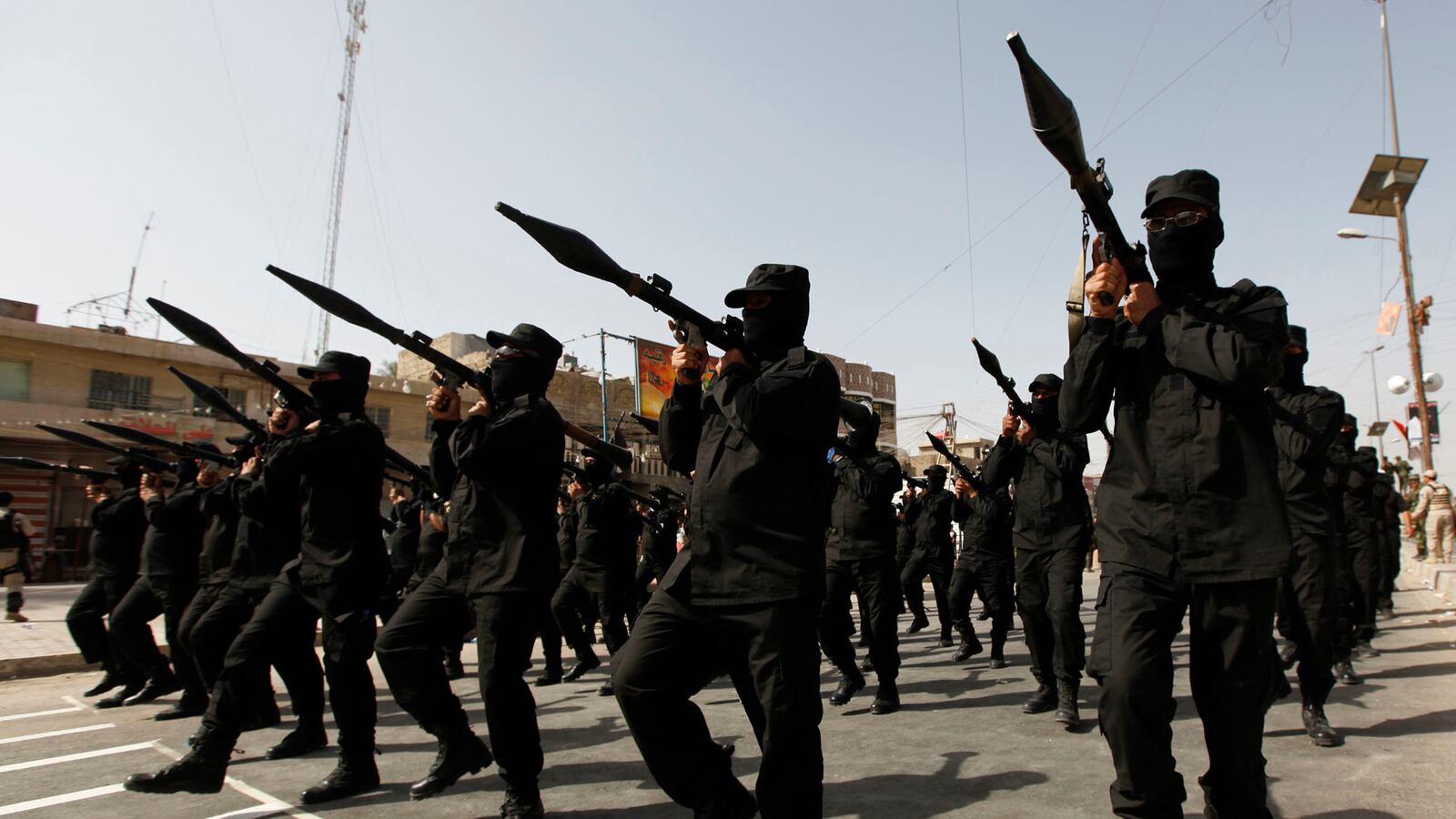EBRIL, Iraq—As Iraq’s Sunni and Shiite Muslims square up for a showdown that many here fear will end up dismembering the country permanently, it is the extreme clerics who are being heeded and the moderates ignored in a climate of seething, confrontational sectarianism.
Despite midweek claims by the country’s beleaguered Shiite Prime Minister Nouri al-Maliki that he has launched a counteroffensive, the Iraqi army wasn’t able to stem Sunni militant advances in the west over the weekend, melting away again as the jihadist-led insurgency racked up more territorial gains, seizing border crossings with Syria and Jordan and overrunning four towns in Anbar Province.
Iraqi commanders insist their soldiers didn’t run away but were withdrawn tactically because they were needed as reinforcements elsewhere. But the claim seemed at odds with the bravado of the army’s spokesman, Gen. Qassim Atta, who the day before insisted the security forces had regained the initiative and would not let the insurgents “take any foot of our earth.”
The territorial gains represent a further consolidation for the al Qaeda breakaway the Islamic State of Iraq and the Sham (ISIS), which controls a swath of land stretching from eastern Syria deep into Iraq. Now the jihadists can move men and guns back and forth between the two countries with even greater ease, depending on tactical needs.
And the sway of the jihadists within Iraq’s Sunni community is growing as tribes, former Baath party stalwarts, and the ex-military of late dictator Saddam Hussein throw in their lot with ISIS. The new alliance is reminiscent of the marriage of convenience that was formed after the 2003 U.S. invasion, when aggrieved Sunnis aligned with al Qaeda to fight the transitional government and the Americans.
Now a rematch is looming between Iraq’s Sunni minority and its Shiite majority—one the Kurds are keen to avoid being drawn into, preferring to focus on the defense of semi-autonomous Iraqi Kurdistan.
The 2003 Sunni alliance broke down after the tribes bristled at al Qaeda arrogance and the jihadist brand of fanatical Islam. Then the tribes joined with the Americans in the “Sunni Awakening” to expel al Qaeda. Today Kurdish peshmerga commanders say tensions within the alliance are likely to increase in this coalition, too. “I don’t see this lasting. It will eventually fall apart,” said Ahmed Askari, the head of the security council of Kirkuk.
Askari’s words appeared prophetic over the weekend, when jihadists clashed with former members of Saddam Hussein’s army in the western Kirkuk suburb of Hawija after insisting the veterans surrender their weapons until they had sworn allegiance to ISIS. Nine former Iraqi soldiers and eight jihadists died in the fighting, say Kurdish officials.
And an inherent contradiction within the Sunni coalition could well trigger a breakup in the longer term. Mansoor Moaddel, a professor of sociology at the University of Maryland who has surveyed opinion polls stretching back to 2004, said Iraq’s Sunni Muslims are more interested in secular politics. Sunnis have been becoming progressively more secular, he said, with 81 percent of Sunnis last year saying they believed Iraq would be a better place if religion and politics were separated. Just 34 percent of Shiites said they felt the same way.
The cooperation between the Sunni tribes and ISIS “may not indicate mass conversion to religious extremism,” Moaddel said. “Rather, it is driven by a common hatred of the Shia sectarian government ruling the country.”
That may well have been the case last year and will possibly be the case again in the future. But as Sunni-Shiite tensions rise, what generally happens in civil wars is happening now in Iraq—the center gives way and the extremes become more powerful as people feel they have to choose sides, if for no other reason than self-protection.
The Shiite show of strength over the weekend, when fighters loyal to the powerful cleric Moqtada al-Sadr paraded in Baghdad, just fanned the sectarian flames and played into the hands of Sunni extremists. The reconstituting of Sadr’s Mehdi army, which fought the U.S. in Iraq for years, represents an existential threat for Sunnis—a threat backed by Iran, which supports the Maliki government in Baghdad.
And when Iran’s top leader, Ayatollah Ali Khamenei, warned America to stay out of the fight Sunday and labeled the Sunni insurgency “sedition,” he likely added to the Sunni sense of being besieged. So did reports that Iranian Revolutionary Guards are already on the ground in Iraq.
Last week, the commander of Iran’s elite Quds Force, Gen. Qasem Soleimani, was in Baghdad to consult with Maliki and his security chiefs. Soleimani has been advising President Bashar al-Assad in neighboring Syria and helping in the fight against Sunni rebels there.
For Moaddel, the polling data of the past decade suggest that to defuse the crisis, the ties between ISIS and the more moderate Sunni groups must be weakened, as well as the ties between the Iraqi Shiites and Iran. And Iraqi moderates have to be encouraged to stick together.
To accomplish just one of those will be a tall order. Maliki’s refusal to step down to give way for a more inclusive government, and the Shiite call to arms as Sunnis make more inroads, are just increasing the odds that none of the three can be pulled off in the short term.






